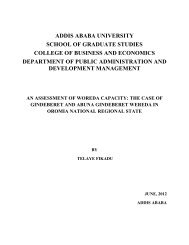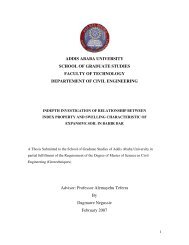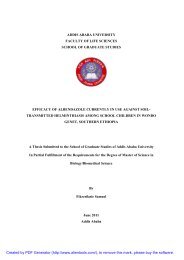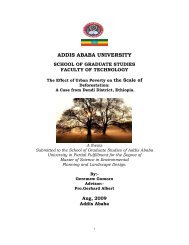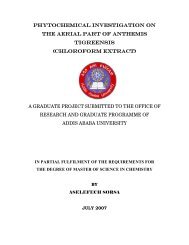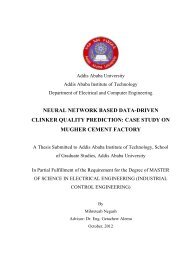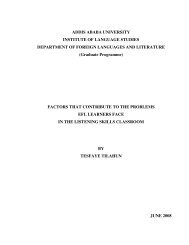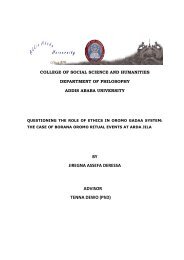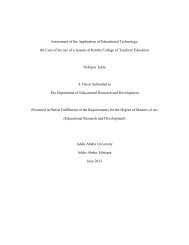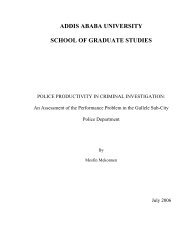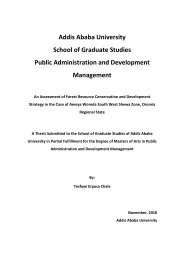HENOK MERHATSIDK 1.pdf - Addis Ababa University
HENOK MERHATSIDK 1.pdf - Addis Ababa University
HENOK MERHATSIDK 1.pdf - Addis Ababa University
Create successful ePaper yourself
Turn your PDF publications into a flip-book with our unique Google optimized e-Paper software.
of the other.” This means that, one state can not go against the interest of another unless the<br />
other allows the negative consequences. In such case, the leader of the two states will strive<br />
to win from the situation by what ever means which is less costly and better (Deutsch,<br />
1978:165). Another author Kopstein and Lichbach believes that the world is partitioned in<br />
different states and these states are often in tension with one another. States are sovereign,<br />
they posses strong defense institution to safe- guard their external securities; they exchange<br />
ambassadors with other states and belong to the “global club of states”, the UN. His<br />
explanation is important in understanding the unavoidable relations between states in their<br />
day- to- day activity. Kopstein and Lichbach perceived the current world situation as follows:<br />
.<br />
Inequality and poverty, the gap between North and South, is a global<br />
problem. Disease and epidemics are global problems. Bubonic plague,<br />
influenza, and smallpox were problems of human kind and AIDS is now<br />
every one’s problem environmental problems are also now global. We are<br />
part of a single ecosystem, and, hence, environmental degradation global<br />
warming, energy conservation, and water pollution are global problems.<br />
In sum, it is not possible for a country to isolate itself from global<br />
economic trends, cycles, and shocks (Kopstein and Lichbach 2005: 18).<br />
States have certain interactions namely; diplomacy, war, trade relations, alliances, cultural<br />
exchange, and participation in international organizations and in those cross-cutting issue<br />
areas. Politicians of one state can behave in a cooperative or conflictual manner, extending<br />
either friendly or hostile behavior toward the other nation (Goldstein, 1992:5).<br />
In the same vein Ethiopia and Kenya established interstate relations immediately after Kenya<br />
got its independence in 1963. These relations have gone through different regimes, ideologies<br />
and political atmosphere. Ethiopia is non- colonized state in Africa while Kenya was ruled by<br />
British colonial administration. During that time, Ethiopia had diplomatic relations with the<br />
British government and there was an attempt to demarcate Ethio-Kenyan boundary.<br />
Additionally, Ethiopia established consular office in Nairobi and she used to support the Mau<br />
Mau movement (Belete, 2005).<br />
After Kenya got independence Jomo Kenyatta became the first president of Kenya. Kenyatta<br />
had close relationship with Ethiopian Emperor Haile Sellassie. This friendship translated to<br />
peaceful relations between the two states. Ethiopia is the first country to open its embassy in<br />
13




